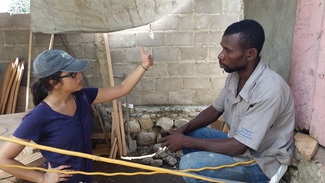 Microgrid Manager Jamie Trahan explains the issue to Napoleon. Microgrid Manager Jamie Trahan explains the issue to Napoleon. by Adam Eberwein Whether in the United States in the 1930’s or in Haiti in present day, rural electrification has always had one primary goal: improve people’s lives. But electricity alone cannot achieve this. Access to grid electricity in Les Anglais has numerous immediate benefits for users at all consumption levels, benefits that can be seen simply by taking a walk through town on a typical evening. With 30 watts of power and LED lightbulbs, a woman can study for entrance examinations into a Port-au-Prince University. A 20-watt radio for one man and an 80-watt television for another provide access to news and sporting events, keeping these customers informed on issues that can impact their daily lives. A 50-watt fan provides another with much needed comfort after a day’s work in the hot sun, possibly stopping the Dengue Fever-carrying mosquito that would have bitten the owner. These all provide instances of improvements in quality of life, but the question that should be asked is, “What’s next?” Introducing income-generating activities in Les Anglais through newly developed business ventures, taking advantage of the availability of affordable, reliable electricity, is an important aspect of EarthSpark and Enèji Pwòp’s work in ‘integrated electrification.’ The business potential of electrification – the productive uses of electricity – can take many forms. For the upcoming corn season in southern Haiti, new customers flock to Les Anglais to use an electric-powered thresher provided by the local women’s coop that will remove dried corn kernels from the cob at a rate of a 180 pounds per hour, a rate significantly faster and less labor intensive than the 20 pounds per hour manual alternatives. A major businessman in town has access to an electric corn mill that, run alongside his existing diesel-powered mills, augments the throughput of corn in his milling business, saving his customers hours of standing in line with their buckets. A businesswoman sells refrigerated drinks from her recently purchased freezer to men visiting for the afternoon for a scheduled hearing at the courthouse. Productive uses of electricity don’t always develop in a town on their own. EarthSpark is working with local businesses and customers to improve this. At times this might mean having a discussion with a customer on the proper use of storing frozen goods or troubleshooting why his or her freezer has failed and making recommendations. To highlight this work, we’d like to share the story of local carpenter - Napoleon Jean Nasso. Napoleon had been hired by a local hotel to build doors and furniture specifically for the speed and quality that his electric power tools could provide. With a looming deadline, he needed to use his power saw, edge grinder and sanding tools. Unfortunately, inrush currents tripped the protective "mov" feature of his smart meter. EarthSpark staff worked tirelessly to overcome this. Solutions are commercially available for inrush current but not locally available. As a temporary strategy to help Napoleon meet his deadline, EarthSpark ordered inrush current dampening thermistors in the US, sized for his particular needs. Before the thermistors could arrive, EarthSpark staff members worked with Napoleon to assess which of his machinery he could use without tripping the meter so he could continue to work. After installing the thermistor, Napoleon was able to deliver on time. These are some examples how EarthSpark and Enèji Pwòp continue to support growth within Les Anglais in the pursuit of an improved and sustained quality of life.
0 Comments
Your comment will be posted after it is approved.
Leave a Reply. |
EarthSpark supporters make our work possible. Thank you for considering a donation towards eliminating energy poverty in Haiti.
Read the full blog - click here!
|
EarthSpark International is a non-profit 501(c)3 organization.
